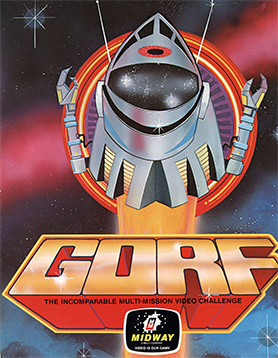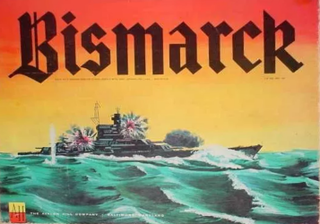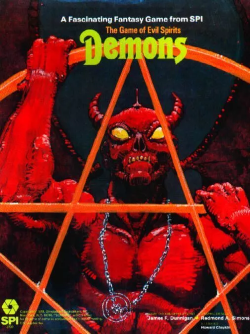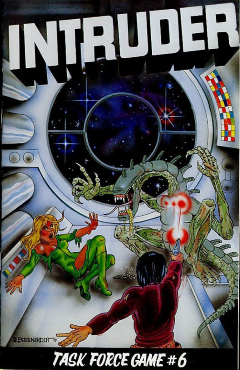
Boarding Party is a solitaire science fiction board game published by Task Force Games in 1982 that simulates a boarding party of humans trying to deactivate a killer spaceship.

Boarding Party is a solitaire science fiction board game published by Task Force Games in 1982 that simulates a boarding party of humans trying to deactivate a killer spaceship.
Boarding Party is a solitaire microgame in which the player controls a party of humans that must board an automated killer space ship that is temporarily disabled and destroy the central computer before the ship can reboot itself and go on a killing rampage. [1] The player only has 14 turns to accomplish this task. [2]
The map represents the narrow winding corridors of the space ship that all lead to the central computer. Automated robots randomly move up and down the corridors at the start of the game. [2] Once the humans have reached the central computer, surviving robots all converge on the central computer room. [2]
Boarding Party was designed by Thomas Condon, and featured front cover art by William H. Keith Jr. and back cover art by R. Vance Buck. It was published by Task Force Games in 1982.
In Issue 64 of Space Gamer , Edwin J. Rotondaro liked the game but questioned its staying power, saying, "Overall, I have to give Boarding Party a B−. The game's not bad, it just doesn't have a lot of replay value." [1]
In Issue 27 of Simulacrum, Brian Train noted, "The cramped map and the inane moves of the robots make the game frustrating at times. I seemed to spend more of my time fumbling at stacks of chits in all too small rooms trying to figure out if they’d just moved or not. A bigger map with ‘spaces’ in which players could stack counters which had just moved and those which had not would have made the game much easier to play." [2]

Klondike is a card game for one player and the best known and most popular version of the patience or solitaire family, as well as one of the most challenging in widespread play. It has spawned numerous variants including Batsford, Easthaven, King Albert, Thumb and Pouch, Somerset or Usk and Whitehead, as well as the American variants of the games, Agnes and Westcliff. The distinguishing feature of all variants is a triangular layout of the tableau, building in ascending sequence and packing in descending order.

Suspended: A Cryogenic Nightmare is an interactive fiction video game written by Michael Berlyn and published by Infocom in 1983. Infocom's sixth game, it was released for Amstrad CPC, Apple II, Atari 8-bit computers, Commodore 64, Commodore Plus/4, IBM PC compatibles, TRS-80, and TI-99/4A. It was later available for Mac, Amiga, and Atari ST.

Gorf is an arcade video game released in 1981 by Midway Manufacturing, whose name was advertised as an acronym for "Galactic Orbiting Robot Force". It is a fixed shooter with five distinct levels, the first of which is based on Space Invaders and another on Galaxian. The game makes use of synthesized speech for the Gorfian robot which taunts the player, powered by the Votrax speech chip. Gorf allows the player to buy two additional lives per quarter before starting the game, for a maximum of seven lives.

Stationfall is an interactive fiction game written by Steve Meretzky and released by Infocom in 1987. It was published for the Commodore 64, Amiga, Amstrad CPC, Apple II, Atari 8-bit computers, Atari ST, and MS-DOS. The game is a sequel to Planetfall, one of Infocom's most popular games. It is Infocom's twenty-fifth game.
There were various games and applications available in Windows Live Messenger that could be accessed via the conversation window by clicking the games icon and challenging a "buddy".
Double Solitaire is a two-player variant on the best-known patience or solitaire card game called Klondike. While it is mostly referred to as Double Solitaire, it is sometimes called Double Klondike. Games with more players are also possible.

Solitaire is a computer game included with Microsoft Windows, based on a card game of the same name, also known as Klondike. Its original version was programmed by Wes Cherry, and the cards were designed by Susan Kare.

Starfleet Orion is a 1978 science fiction strategy game written and published by Automated Simulations. It appears to be the first space-themed strategy game sold for microcomputer systems. The game was originally written in BASIC for the PET, but later ported to other early home computer platforms including the TRS-80 and Apple II. The game was something of a success, leading to a string of successes for the company, notably the major hit Temple of Apshai.

Bismarck is a board wargame published by Avalon Hill in 1962 that simulates the hunt for the Bismarck.

Bloodshot, also released as Battle Frenzy in Germany, is a video game developed by Jim Blackler for Domark in 1994 for the Mega Drive and the Mega-CD in Europe. A North American release was planned, and reviewed in gaming magazines, but was only released through the Sega Channel service.
Dunjonquest is a series of single-player, single-character fantasy computer role-playing games by Automated Simulations. Temple of Apshai was the most successful and most widely ported game in the series. The games relied on strategy and pen & paper RPG style rules and statistics.

Demons is a board game published by Simulations Publications (SPI) in 1979 in which players control magicians who conjure demons to aid them during a treasure hunt.

Intruder is a solitaire science fiction microgame published in 1980 by Task Force Games in which a rapidly maturing alien roams a space station, ambushing and killing crew members.

Hot Spot is a science fiction board wargame published by Metagaming Concepts in 1979 that simulates the battle for possession of a molten planet.

Robots! is a microgame published by Task Force Games in 1980 in which players fight each other using combat robots.

Ram Speed, subtitled "Naval Warfare in the Bronze Age", is a two-player microgame published by Metagaming Concepts in 1980 that simulates naval combat between galleys in the Mediterranean during the Bronze Age when the preferred method of attack was ramming a ship.

Space Empires is a science fiction board game published by Mayfair Games in 1981.

Moon Base Clavius is a science fiction board wargame published by Task Force Games in 1981.

Orb Quest is a 1982 fantasy role-playing game adventure for The Fantasy Trip, published by Metagaming Concepts.

Alien Mind is an action-adventure game for the Apple IIGS, published and released by PBI Software in 1988. It is the final game from PBI, and notable as a GS-only title, in taking advantage of the graphics and sound capabilities of the machine to present an arcade style game.